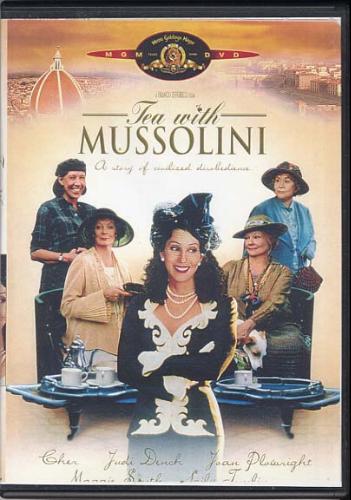Tea With Mussolini review by Jackass Tom
Tea With Mussolini is a departure from what we usually see from Franco Zerfferelli. In Tea we have an original screenplay not based on a Shakespearian play or an Italian opera. Instead it’s a screenplay apparently drawn from Zefferelli's boyhood. Tea With Mussolini is an homage to a group of mostly elderly British women (known to him in real life as 'The Scorpians') who in the 1930s made Florence, Italy their home away from home. The women, in particular Mary (Joan Plowright), serve as caretakers for a young boy named Luca (Baird Wallace, Charlie Lucas) who isn’t particularly wanted by his jerk father. Luca is the Zefferelli character – in case that needs pointing out. The women teach Luca how to be an English gentlemen and appreciate fine art, all while the world is changing around them. As WWII ramps up, the facists make life for the emigres uncomfortable and when that wasn’t enough round them up to hold in captivity.
The title Tea With Mussolini refers to a photograph one of the women, the haughty Lady Hester Random (the always imperious Maggie Smith), totes around with her in which she is having tea with the fat headed dictator himself. It’s a reminder that Benito isn’t such a bad guy and the concentration camp they are staying in must be some sort of gross mistake that will soon be corrected. Stubbornness is at the heart of the film as no one seems willing to either leave Italy on their own, or willing to admit that the government has turned on them until its painfully obvious to everyone involved.
In the middle of all of this with Luca is Elsa (Cher), a rich American socialite who acts as the anti-Brit. Instead of being reserved, she is outrageous and loud. Instead of admiring art, she simply purchases it. Because of this she is the scorn of old ladies, but for some unexplainable reason she also becomes their savior. Why? She feels bad for them, despite the fact they speak ill of her at every chance they get. Its rather unexplainable and perhaps its fact (or perhaps not) but it's not certain beyond eccentricity why she picks them to protect with her money.
And that also leads me (indirectly) towards where the movie fails. Its treatment of the war is done with kid gloves. The old women are coddled and protected by the story Zefferelli provides which seems unlikely given its backdrop. As they are taken and rounded up and taken away from their homes they fight back. How do the Italian soldiers react? They push them into the vehicle and try to ignore their barbs. The women act indignant when they are brought each day back to the camp. Do the soldiers react? No, not in a way you expect from a fascist Italian soldier. Most shockingly of all is when they confront Nazis who are willing to blow up a church. In protest some of the women jump on the bomb thinking, "Well, they won't detonate it if a human is in the way." Yes, ladies and gentlemen, these are the kinder, gentler Nazi's that we don’t often hear about in Hollywood's spin machine. I counted about five times that Maggie Smith's character should have been shot – in fairness one of the times would have been by me if it didn't mean me buying a new television.
This treatment with the war was even more irritating given the arrogance of some of the women. Lady Hester kept complaining about her conditions as she is used to being treated like royalty. Arabella (Judi Dench) was crying about losing a mosaic here and a painting there. Meanwhile, in parts of the world not that far away PEOPLE ARE DYING IN MASSES!!! The lives of these women, considering their absurd decision not to flee back to England seem rather insignificant under the circumstances.
Because of this light hand with the war, I wondered how much was based on real events. Interpreting "real" is tricky because as the movie opens, Zefferelli’s character can’t be more than 7 years old and is probably more like 16-20 during the heavier parts of the war. So the sixty years between experience and filming for a much older Zefferelli could have changed in many ways. Zefferlli admits this much in interviews, but its unclear how much was real and how much was filmic entertainment. Even some of the characters (such as Lady Hester) were based on real people, but had been interpreted by an author first and then the actress. But as far as real events, there is little mention; I’m going to assume there is plenty of fiction on screen.
There are beautiful shots of Florence (sans tourism) and some fun playful moments (Mary creating a Romeo and Juliet scene out of a box for a young Luca eluding to Zefferelli's later inspirations) but in all it’s a rather soft film. Tea With Mussolini was recently re-released onto DVD in a new Cher: The Film Collection box set with five other movies. This box set is simply a repackaging of already released DVDs with no new material.
LINKS:
* James Brewer of WSWS.org feels more passionate than I do about Zefferelli's treatment of the war saying, "It is rather a cheap shot at history, encouraging the viewer to embrace the Scorpioni's rather ignorant and limited view of World War II as just 'some idiots who want to make war'."
* An Interview with Franco Zeffereli by Dan Lybarger that provides a bit of insite on Tea.




4 out of 10 Jackasses
Search
Tea With Mussolini

IMDB Link: Tea With Mussolini
DVD Relase Date: 1999-11-23
DVD Aspect Ratio: 1.85:1
DVD Extras: Trailer